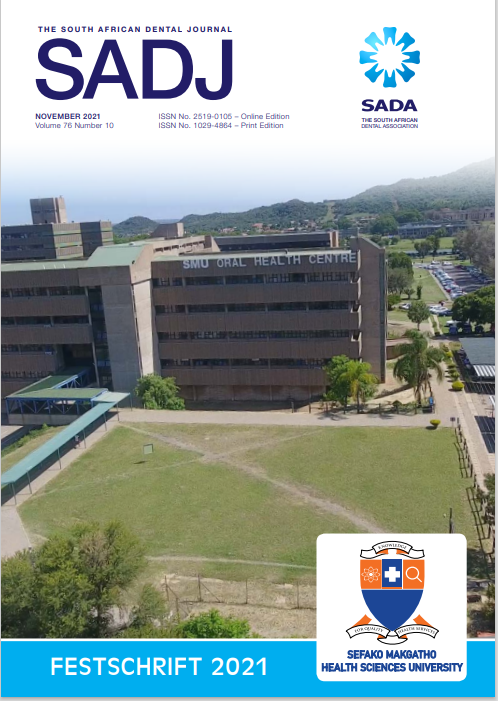Children’s Rights and Oral Health
DOI:
https://doi.org/10.17159/2519-0105/2021/v76no10a11Keywords:
commensurate, nherently immateriaAbstract
Despite clear legal promulgations by section 27 of the Constitution and Children’s Act 38 of 2005, the best interests of children are generally undermined or ignored. The lack of respect for the rights of children is difficult to quantify; the extent to which “children are seen and heard” is under-reported. Culture, religion, patriarchy and socioeconomic condition are among the factors that exacerbate
blatant disregard conditions for children’s rights. Health care professionals are not adequately informed about the rights of the child and how to ensure that their interest are protected during oral health care. Consequently, children may suffer neglect and harm during dental care. Practitioners must familiarize themselves regarding their responsibilities and roles when treating children. Additionally, teaching institutions and regulatory bodies must provide continuous professional development on legislation that regulates the protection of children within health care service. This case study seeks to provide a legal framework for oral health
practitioners when dealing with consent for minors during dental care.
Downloads
References
Mahery P, Proudlock P, Jamieson L. A guide to the Children’s Act for health professionals. A guide to the Children's Act for health professionals. 2010.
Kling S. Ethical issues in treating children: ethics. Current Allergy & Clinical Immunology. 2011;24(4):218-220.
Pashkov V, Olefir A. Protection of children's rights in the health care: problems and legal issues. Wiadomosci Lekarskie (Warsaw, Poland: 1960). 2017;70(6 pt 1):1122-1132.
Burman S. Allocating parental rights and responsibilities in South Africa. Family Law Quarterly. 2005;39(2):429-439.
Dawes A. The South African children's act. In: Taylor & Francis; 2009.
Songca R. Evaluation of children's rights in South African law: the dawn of an emerging approach to children's rights? Comparative and International Law Journal of Southern Africa. 2011;44(3):340-359.
Bonthuys E. Parental rights and responsibilities in the Children's Bill 70D of 2003. Stellenbosch Law Review. 2006;17(3):482-493.
September R, Dinbabo M. Gearing up for implementation: A new Children's Act for South Africa. Practice. 2008;20(2):113-122.
Proudlock P, Jamieson L. The Children's Act: providing a strong legislative foundation for a developmental approach to child care and protection. 2009.
Matthias CR. Parental responsibilities and rights of unmarried fathers: court decisions and implications for social workers. Social Work. 2017;53(1):96-108.
Page E. Parental rights. Journal of Applied Philosophy. 1984;1(2):187-203.
Heaton J. Parental responsibilities and rights. CJ Davel and AM Skelton (eds). 2007;3:1-3.
Smith LA, Tumilty E, Page LF, Thomson WM, Gibson B. Children’s rights in their oral health care: How responsive are oral health professionals to children’s rights. The International Journal of Children's Rights. 2018;26(2):354-378.
Downloads
Published
Issue
Section
License

This work is licensed under a Creative Commons Attribution-NonCommercial 4.0 International License.






.png)